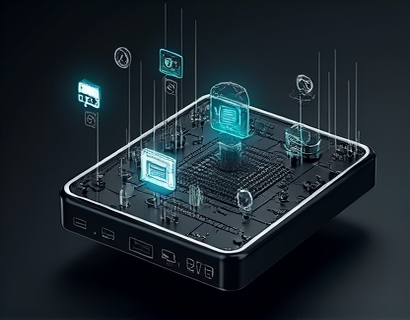AI-Driven Healthcare: Revolutionizing Personalized Medical Insights and Expert Advice
In the rapidly evolving landscape of healthcare, the integration of artificial intelligence (AI) is transforming the way individuals access and receive medical advice. This shift towards AI-driven healthcare solutions offers unprecedented opportunities for health enthusiasts and individuals seeking personalized support. By leveraging advanced technology, these platforms provide instant, personalized medical insights and expert advice, empowering users to make informed decisions and enhance their overall well-being.
The advent of AI in healthcare is not merely a trend but a transformative force that is reshaping the industry. Traditional healthcare models often struggle to provide timely and personalized care due to resource constraints and the complexity of medical information. AI-driven platforms bridge this gap by offering real-time, data-driven insights that cater to the unique needs of each individual. These platforms utilize machine learning algorithms to analyze vast amounts of medical data, enabling them to provide accurate and relevant advice.
Instant Access to Personalized Medical Insights
One of the most significant advantages of AI-driven healthcare platforms is the instant access to personalized medical insights. Users can receive tailored advice on a wide range of health topics, from common ailments to complex medical conditions. This immediacy is crucial in today's fast-paced world, where individuals often seek quick answers to their health concerns. Whether it's understanding symptoms, exploring treatment options, or managing chronic conditions, AI-driven platforms offer timely and accurate information.
For instance, a user experiencing persistent headaches can input their symptoms into the platform, and within moments, receive a detailed analysis. The AI system might suggest possible causes, recommended diagnostic tests, and potential treatment options. This level of instant personalization is unparalleled in traditional healthcare settings, where patients often face long wait times and generalized advice.
Expert Advice at Your Fingertips
Another key benefit of AI-driven healthcare is the ability to access expert advice without the need for in-person consultations. These platforms connect users with a network of medical professionals who contribute to the development and validation of the AI algorithms. This collaboration ensures that the advice provided is not only timely but also grounded in the latest medical research and best practices.
Users can engage with these experts through text-based interactions, voice calls, or even video consultations, depending on the platform's offerings. The AI system can route complex queries to human experts when necessary, ensuring that users receive comprehensive and nuanced advice. This hybrid approach combines the efficiency of AI with the empathy and expertise of human healthcare providers, creating a more holistic and effective support system.
Enhanced Well-Being Through Data-Driven Insights
The data-driven nature of AI-driven healthcare platforms contributes significantly to enhanced well-being. By analyzing user data, these platforms can identify patterns and trends that may not be immediately apparent to individuals. For example, an AI system might detect correlations between certain lifestyle factors and health outcomes, providing users with actionable insights to improve their health.
Personalized health recommendations based on this data can range from dietary adjustments and exercise routines to stress management techniques and sleep hygiene practices. Users can track their progress over time, receiving continuous feedback and adjustments to their health plans. This proactive approach to health management empowers individuals to take control of their well-being, leading to better health outcomes and a higher quality of life.
Transformative Impact on Health Enthusiasts and Individuals
For health enthusiasts and individuals committed to their well-being, AI-driven healthcare platforms offer a transformative experience. These platforms democratize access to high-quality medical information and expert advice, breaking down barriers that often limit traditional healthcare access. Whether someone is managing a chronic condition, seeking preventive care, or simply looking to optimize their health, these platforms provide valuable resources and support.
Moreover, the personalized nature of AI-driven advice ensures that each user receives a tailored experience. The platforms adapt to individual needs and preferences, continuously learning and improving based on user interactions. This level of customization is particularly beneficial for individuals with complex health histories or those requiring ongoing monitoring and management of their conditions.
Addressing Common Health Concerns with AI
AI-driven healthcare platforms are equipped to handle a wide array of health concerns, from common colds and flu to more serious conditions like diabetes and heart disease. For instance, a user with diabetes can input their blood glucose levels, medication schedule, and dietary habits into the platform. The AI system can then provide insights into how these factors affect their condition, suggest adjustments to their management plan, and alert them to potential complications.
Similarly, individuals with mental health concerns can benefit from AI-driven tools that offer coping strategies, mindfulness exercises, and access to mental health professionals. The platform can monitor user input over time, identifying patterns and providing timely interventions to support mental well-being.
Building Trust Through Transparency and Reliability
Trust is a critical component of any healthcare solution, and AI-driven platforms prioritize transparency and reliability to build user confidence. These platforms are developed in collaboration with medical experts and adhere to strict data privacy and security standards. Users can trust that their information is handled with the utmost care and that the advice provided is based on credible sources.
Additionally, many AI-driven healthcare platforms offer explanations for their recommendations, helping users understand the reasoning behind the advice. This transparency not only builds trust but also educates users, empowering them to make more informed decisions about their health.
Integration with Wearable Devices and Health Apps
One of the most exciting aspects of AI-driven healthcare is its integration with wearable devices and health apps. These integrations allow for seamless data collection and real-time monitoring of various health metrics, such as heart rate, sleep quality, and physical activity. The AI system can analyze this data to provide comprehensive insights and personalized recommendations.
For example, a user wearing a smartwatch can have their heart rate data automatically synced with the AI platform. If the system detects irregularities, it can prompt the user to consult a healthcare professional or suggest lifestyle changes to improve cardiovascular health. This integration not only enhances the accuracy of the advice provided but also fosters a more connected and proactive approach to health management.
Overcoming Challenges in AI-Driven Healthcare
While AI-driven healthcare offers numerous benefits, it is not without challenges. One of the primary concerns is the accuracy and reliability of the AI algorithms. Ensuring that these systems provide accurate and safe advice requires rigorous testing, continuous monitoring, and regular updates based on the latest medical research.
Another challenge is the digital divide, where not all individuals have equal access to the technology required to use AI-driven healthcare platforms. Efforts to make these tools more accessible, such as developing user-friendly interfaces and offering support for various devices, are essential to ensure equitable access to these benefits.
The Future of AI-Driven Healthcare
As AI technology continues to advance, the potential for innovation in healthcare is vast. Future developments may include more sophisticated predictive analytics, enhanced virtual reality experiences for therapy and education, and deeper integration with electronic health records. These advancements will further enhance the capabilities of AI-driven healthcare platforms, making them even more powerful tools for improving health outcomes.
In conclusion, AI-driven healthcare represents a significant leap forward in providing personalized medical insights and expert advice. By leveraging advanced technology, these platforms empower individuals to take control of their health, leading to better-informed decisions and enhanced well-being. As the healthcare industry continues to embrace AI, the future looks promising for those seeking high-quality, accessible, and personalized healthcare solutions.










































